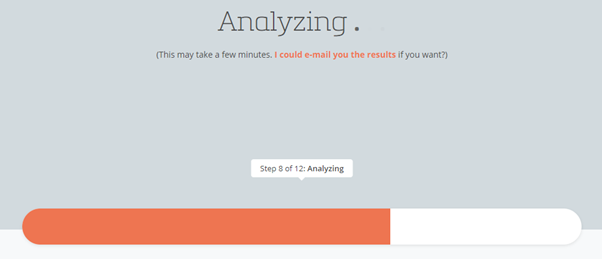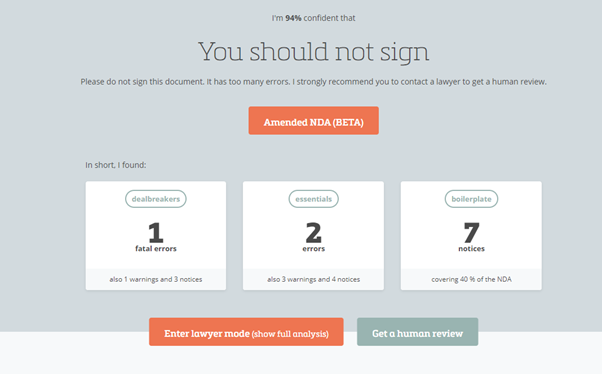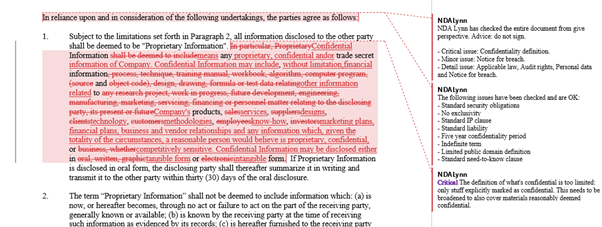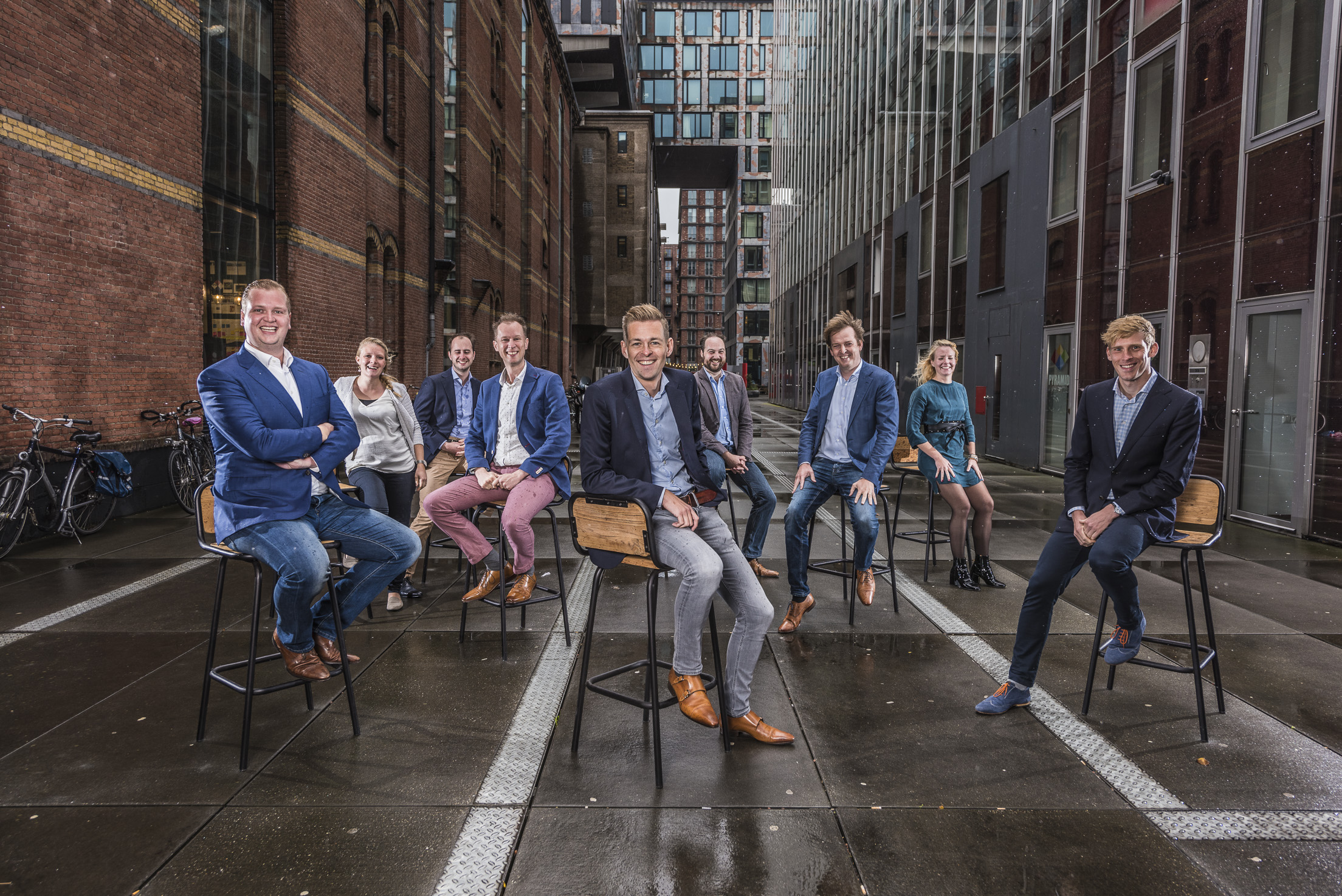Non-disclosure agreements (NDAs) or confidentiality agreements are a fact of life if you’re in business. You’ve probably read tons of them, and you know more or less what you would accept. Still, every NDA has different legal language. Meaning that a lawyer is needed to review each one. This costs time and money, which should not be necessary for a simple standard document like this. IT lawyer Arnoud Engelfriet took a different approach: he created a robot lawyer that reads and amends NDAs automatically.
His company, JuriBlox Labs launched a lawyerbot named ‘NDA Lynn’.
Here’s how it works
NDA Lynn is designed to be as easy as possible to operate. When you load the site, you are asked only one question:

This is based on the central premise that a lawyerbot should save people time. In this case, people that are faced with an NDA and need to know if they can sign. All that is needed then is knowing whether the people give information or get it, or both.
When this question has been answered and the document has been uploaded, NDA Lynn goes to work.

In one to two minutes, the review is complete. The user is presented with a clear overview of issues, and can download the amended document with one click.

The document contains amendments and comments to every objection:

This type of technology is being deployed in more and more fields. The lawyer uploads a document in Word or PDF and receives a full overview of issues including an analysis of the impact and adaptations in the document. For instance, labor agreements can be reviewed the same way and a seller can review general purchasing terms and get a list of key issues that need to be negotiated away.
Here’s what the founder has to say about his journey and vision for NDA Lynn:
Can you tell us a bit about your background?
I’m an IT lawyer and European patent attorney, operating from Amsterdam, the Netherlands. I’ve been working for my firm (now with 60 lawyers) since 2008. We focus on complex technical / legal IT issues, GDPR/privacy and software. I’m also a part-time lecturer at the Free University Amsterdam.
Before joining ICTRecht, I worked for nine years as a Patent attorney and IP Counsel at Royal Philips Electronics. His field of activity included software, ICT contracts, joint collaboration agreements (JDA’s) and patent and technology licenses. I taught the Bangalore, India software division about open source, and taught at Renmin and Tsinghua Universities in Beijing, China.
What was your inspiration to create NDA Lynn?
Ever since I started as a lawyer, I had to review NDA’s. I must have reviewed over 2000 of them by now. Every NDA is the same but also different, which seems like a huge waste of time to me. So in 2017 I started experimenting with machine learning to see if the typical NDA contract clauses could be recognized automatically. That would save me huge amounts of time and I wouldn’t have to spend that reading boring NDA texts anymore.
What has been the journey so far?
The first version of the tool could recognize almost every clause, and assign a score how problematic it was. You would get a report saying “Liability is too high” or “Duration is too long”. We have come a long way. Now, NDA Lynn can take your Word document, add comments in the document explaining what is wrong and also produce markup (Word redlines) to change problematic clauses to something acceptable to both sides.
Meet the NDA Lynn Team:

How are you dealing with competition?
NDA Lynn is free of charge, so in that sense there is no competition. The premium edition costs money, and allows you to change the reporting. For instance, if you want high liability you can configure Lynn to accept that, or if you think NDA duration should be at most 2 years you can put that in.
Here we do face competition, but those other tool tend to aim at the high-end market, i.e. the expensive law firms. We created Lynn explicitly for the average business people or the overworked company lawyer who just needs to know “Can I sign this document”.
Relevance to the Asian context
Early on, we identified the Asian markets as a very attractive opportunity. Right now we see 35% of traffic coming from Asian countries. And India contributes to about half of that percentage. We think this is because getting access to an easy yet legally correct review of an NDA is hard, especially if your counterpart is in the USA. As we all know, getting a US lawyer to make a quick review is not an easy task.
How the next 5 years look like
We commit to keeping NDA Lynn free of charge, and making Lynn legally compatible at all times. Fortunately, there are very few laws that affect NDAs, so our reviews normally are legally correct all around the world. This helps making law accessible to everyone, which has been one of my dreams for a long time. We are still looking for a good partner in the Asian market who can help resell Lynn adapted to local markets, so our focus will definitely go there more.
Advice for fellow changemakers and readers
NDA Lynn is an example of a small, self-contained legal tech application. You can use it to assist the lawyer by doing an initial review. But you can also have the business use the tool, so that the lawyer simply isn’t involved unless Lynn flags serious issues. We have had many success stories in companies where large legal tech solutions failed. We think this is precisely because Lynn is a small tool that solves one specific, easy to understand problem. If you want to go to legal tech, specific and easy to understand is the way to go.
Try NDA Lynn for yourself: https://ndalynn.com
If you are interested in trying out the premium solution or wish to become a reseller, please reach out to a.engelfriet@Juriblox.nl
Also read: Here’s how you can save time while drafting agreements
